- Home
- Lloyd Alexander
The Iron Ring Page 3
The Iron Ring Read online
Page 3
"And I do not abide by your judgment," replied Shesha. "You have a sword to enforce it," the Naga prince added. "With it, you can easily kill me if you choose, whereas I have no such weapon. If you wish to dispute me, do so without your blade. Unarmed, strength against strength. This monkey's miserable life? I challenge you to wrestle me for it."
5. Naga Raja
"No, no, that won't do at all." Rajaswami raised a protesting hand. "My dear Prince Shesha, you complained of being at a disadvantage. What you propose is entirely to your own advantage. The match is grossly unfair.
"There, you see how he is," put in Hashkat, who left off grooming his long and luxuriantly furry tail. "Sneaky and slippery. Of course he'd choose wrestling. With those wriggling, writhing coils, he'd have it all his way. I suggest a footrace."
"Be silent," ordered Shesha. "You have no say in this."
"And you, my boy," Rajaswami added to Tamar, "I'm not certain it would be proper for you to take the risk. After all, you have a previous engagement, so to speak."
"By the code of honor, a warrior doesn't refuse a challenge," replied Tamar.
"Perhaps I can think of some exception to that rule," said Rajaswami.
"No discussions," the Naga prince hissed. "No hairsplitting excuses." "A fine one to talk of hair," muttered Hashkat, curling a long upper lip. "Bald from head to tail."
"These are my terms," Shesha went on, ignoring the monkey. "We wrestle in the water."
"Really, prince, you go too far," Rajaswami interrupted. "There you are even more at home than on land."
"Let him continue," Tamar said, "and make his challenge clear."
"If, even for an instant, you bring any part of me to dry ground," said the Naga prince, "I withdraw my claim. If you fail, or if you choose to give up the contest, his life is forfeit."
"Agreed and accepted. And you, king of monkeys," Tamar said, "stay here until the match is decided."
"What?" cried Hashkat. "I sit and cool my heels, my life in the balance, while you two flop around in a river? Majesty, with all respect, suppose you lose? I'm expected to give myself into his hands-hah, what hands? and be swallowed up or squeezed into a pulp?"
"You'll wait with Rajaswami," Tamar ordered. "I want your solemn vow as a king."
"Of course, of course." Hashkat grumbled, "I know all about kings' solemn vows."
"See that you keep yours." Tamar stripped off his buckskins and shed his sandals while Hashkat hunkered down on the bank.
The Naga prince had already slithered into the river, leaving barely a ripple in his wake. Tamar plunged after him. No sooner was he in the water than he realized his mistake. He had misjudged the swiftness of the current, and had to fight against it even before grappling with Shesha.
He shook his dripping hair from his eyes. At first, he saw nothing of the serpent. When he did glimpse Shesha's head surfacing for a moment, he understood that he had made yet another miscalculation. The Naga prince intended staying in the middle of the river, making it all the more difficult for Tamar to force him to either shore.
Strong swimmer though he was, by the time he reached the spot where he had seen Shesha, Tamar's muscles ached with the strain of battling the current. The Naga prince had vanished. Treading water, Tamar cast around for Shesha.
Suddenly the river churned into foam. Shesha's tail lashed around Tamar's waist. Next instant, he was being dragged toward the river bottom. The Naga prince, Tamar realized, had chosen to fight not in the water but under it.
Before Shesha could throw another coil around him, Tamar squeezed free and shot to the surface, filling his lungs with air as the serpent turned and attacked. His best hope, he calculated, was to swim for shore, staying always a little out of reach, luring the Naga prince into the shallows.
Kicking his legs, sweeping his arms, Tamar struck out for the green line of the riverbank. Shesha writhed ahead of him, swung around to block his way, then lunged to seize him. Tamar flung himself aside as water roiled around him, and once more made for the river's edge. Shesha, however, gripped him by a leg and plunged downward.
Mud and gravel from the river bottom swirled in a yellow-brown cloud. Tamar, blinded, could not tell whether he was grasping Shesha's head or tail, but threw himself astride the scaly body and clung as to a bucking horse. The Naga prince heaved up and down, thrashing first one way then another, to dislodge his rider.
Their struggle brought them to the surface, but Tamar had only a moment of breath before Shesha dove again, straight to the riverbed; and there rolled over, slithering through weeds and water plants, across jagged rocks, seeking to scrape Tamar loose. Here, Shesha made his own miscalculation. The serpent lunged through a tangle of dead branches that clawed Tamar away, but left the Naga prince trapped amid the limbs as if caught in a net.
Tamar floated free. He glimpsed Shesha flailing vainly in the mesh of branches. The Naga prince halted a moment, swung his head around, and stared coldly. Tamar hesitated; he had only to swim upward into air and sunlight, leaving Shesha below in a death trap. The serpent was watching him without a sign of surrender or plea for help, only the flat, steady gaze.
A few strokes brought Tamar to the imprisoning branches. Holding what breath he had left, he threw all his strength against the underwater thicket, while Shesha heaved and strained until the limbs gave way. Tamar kicked clear of them and headed for the surface.
The Naga prince seized him. For all his outraged struggles, his fury at betrayal instead of gratitude, Tamar could not escape. Shesha bore him farther along the riverbed. Lungs ready to burst, Tamar found himself dragged into a black tunnel.
The passageway curved downward, turned up sharply first one way then another. Tamar could breathe again. The water had fallen away. Shesha wriggled onto the wide shelf of what seemed the mouth of a cavern. Still gripping Tamar, the serpent slid through the arching entrance and unwound his coils. Panting, Tamar stumbled to his feet and turned, angry and questioning, on Shesha.
"You have broken off our contest, Prince Shesha. Do you dare claim to have won?"
"Our combat is unfinished," Shesha declared, "but, since you saved my life, I fight no more against you. As there is no clear victor, I leave it to my father to say in his wisdom where justice lies."
Shesha motioned with his head. At the far end of the cavern, two huge serpents lay on thrones of carved crystal. Both wore crowns encrusted with jewels. The chamber itself blazed with gems set into the walls and heaped high in every corner.
Tamar stared at the dazzling stones. "Where have you brought me?"
"To the heart of the Naga-loka," replied Shesha. "This is the palace of my father and mother."
The elder serpent stretched up and spread his hood. His ancient scales were thick, heavy as armor, gleaming and twinkling as he swayed erect. His tongue flickered in and out while his voice came as a long, sighing whisper.
"Approach, King of Sundari. I am Takshaka, the Naga Raja; and, here, my revered wife, Shila Rani."
"How do you know me?" Tamar stepped closer to the thrones. On either side, he saw other serpents, the Naga courtiers and attendants, coiled and looking at him in silent curiosity.
"You have been observed many times," Takshaka replied. "The domain of the Naga-loka reaches through all waterways, through all rivers and lakes. We see you here and there in Sundari when you take your ease at a woodland pool or ramble along a stream."
"The doings of a small king of a small kingdom should hardly interest the Naga folk," Tamar said.
"The deeds of kings are always of interest," said Takshaka, "to others, if not to themselves. The actions of the powerful have bearing on all around them."
"This is true," Shila Rani said. "Listen." One day, beside a brook, A half grown boy Played in the grass And laughed with joy To see a Naga Hatching from its shell.
The lad was strong and fearless And could well Have crushed the feeble snake Beneath his heel Without a second thought Or need to feel Remorse or grief But, no, He turned asi
de And let the Naga live That might have died.
"The new-hatched Naga was Prince Shesha," explained Shila Rani, "and you were that half-grown boy."
"If I left him unharmed, I'm glad," replied Tamar, "but I remember nothing of that day."
"We remember," said Takshaka. "We Naga are an ancient folk. We have seen much. Little happens in your human realm that escapes our notice. And we forget nothing."
"Even so," said Shila, "we are puzzled to find you in our kingdom."
"I begin a long journey," Tamar said. "Allow me to continue it."
"Not yet," said Shesha. "We wrestled over the life of Hashkat, the one who calls himself king of the Bandar-loka," he added to Takshaka, "and now ask you to judge us."
"Why concern yourself with foolish monkey folk?" asked the Naga Raja.
"I am concerned when anyone dares to steal what is mine," said Shesha, beginning his account of what happened at the riverside. When he had finished, Tamar offered his own.
"All that Prince Shesha tells is true," he concluded. "Whether Hashkat would have stolen the gem or given it back, I do not know. I cannot guess his intentions. In any case, the gem was not stolen. Prince Shesha has it still, and has lost nothing. Should Hashkat be punished for what he might have intended, but did not do? Perhaps, perhaps not. Either way, it should not cost him his life. I say no more than that."
"Prince Shesha acted correctly," the Naga Raja declared. "He was gravely offended. It was his right-indeed, his dharma required it. Correct-yes, but only up to a point. The punishment would have gone beyond that point."
The Naga Raja turned to Shesha. "You allowed your wrath to overwhelm you. That was an offense against reason. You would have used power against the powerless. That, my son, was an offense against compassion. In the light of those considerations, hear my judgment: The monkey's life is to be spared."
"I am reprimanded." Shesha bowed his head. "You have spoken in your wisdom. Let it be as you have decided."
"And you, King of Sundari," put in Shila Rani, "we are curious to know what led you to this encounter. A journey, you said? What is the nature of it?"
"A dream," Tamar said, after describing his night in the palace. "Sometimes I think it is nothing more. Yet, when I see the ring on my finger I must believe it happened, then only doubt and wonder again.
"Can you help me?" he went on. "Your domain reaches far and wide. Do you know of King Jaya? Of Mahapura? That would assure me there is such a person, at least."
"Only vague rumors, nothing more," answered Takshaka. "I am saddened I cannot ease your heart."
"I, too," Tamar said. "Now let me join my acharya and Hashkat. The monkey will be glad to hear your judgment."
"You have my leave," the Naga Raja said. "Prince Shesha will guide you through the passageways. First, as token of our goodwill, choose gems from any that you see here."
"Thank you," replied Tamar, "but your goodwill needs no token. Where I go, I have no need of jewels."
"Will you dishonor us by refusing an offered gift?" said Shila Rani. "Take as many as you please, King of Sundari."
Takshaka likewise insisted. So obliged, Tamar went to the heaps of precious stones, scanning one after the other. Among them glittered diamonds bigger even than Jaya's. Any one of them would have made his kingdom rich, if he broke off his journey and brought this treasure back to Sundari. He wondered if it was his karma to do so, and if this was the purpose of his dream. Ruefully, he shook his head. His eye fell on the smallest of the gems: a ruby that fit easily into the palm of his hand as he bent and picked it up.
"I choose this one," he said, "though your generosity is greater than any of your jewels." The Naga courtiers whispered among themselves. Takshaka nodded approval. "You have chosen modestly, without greed," the Naga Raja said. "I commend you. Your choice is more interesting than you know. We call it 'Fire Flower. See the lotus carved on it. This is the most curious of our treasures. One of my people found it by chance in a lake bed and bore it to me. How or why it came to be there is a mystery."
"And may always be," added Shila. "Now it is yours."
As Tamar pressed his palms together in the gesture of namaste, to thank and honor the Nagas, Prince Shesha declared:
"I will take you back to the river. Tell the monkey he is fortunate that my father was more lenient than I."
Tamar followed Shesha from the cavern and took firm hold of his tail as they slid through the tunnels. Once gaining the shallows, Shesha twisted away, leaving Tamar to find his footing amid the pebbles and flat stones of the riverbed.
The Naga prince vanished. Tamar stood, pulling off the strands of weeds clinging to his face. Before he could wipe the water from his eyes and clamber ashore, laughter burst from the riverbank.
6. A Beautiful Gopi
Some dozen dark-skinned and bold-eyed girls knelt by the shallows where they had been doing their laundry. By the time Tamar, taken by the sight, realized he had left his buckskins with Rajaswami, the girls burst into greater fits of laughter. Stepping back into deeper water, he slipped and went floundering head over heels, making them laugh all the more. He came up choking; and, even for a king, found it as difficult to keep his dignity as it was to keep his footing. He wondered if he was blushing royally.
The girls, meantime, giggled among themselves. Some frankly stared; others made a show of covering their faces with the ends of their saris, or whispered behind their hands, all of them finding his predicament marvelously entertaining.
In better circumstances, Tamar would not have objected to the attentions of winsome young women; by now, however, he had had his fill of being soaked and chilled, let alone being giggled at, and he called out to them to throw him one of the garments they had been scrubbing.
This set off a new chorus of laughter as the maidens waved pieces of laundry at him, urging him to come ashore and fetch them for himself.
"Never fear, we won't harm you," cried a girl. "We're only bashful gopis-cow-tenders, village milkmaids. You see how shy we are." One of the gopis at last had mercy on him. She picked up a length of cloth and waded knee-deep into the current. Some of her companions egged her on; others teased her as much as they had Tamar.
"Look at Mirri, the shameless creature," clucked one. "How does she dare? A stranger! Who knows what sort he is?"
"A handsome sort," replied her neighbor. "You're only vexed you didn't think of it first."
Instead of wrapping himself in the linen that the gopi named Mirri held out to him, Tamar only gaped like a smitten idiot. Of darker complexion than her companions, her skin glowed richly; her shining black hair fell to her waist. The ruby was clutched safely in his hand, but his heart was leaping every which way like a fish on a line. Paying no attention to the gopis whooping merrily along the shore, his gaze never leaving Mirri, who stood with the current swirling around her, he began:
A stranger, lost, from riverbed I rise To lose myself once more in lotus eyes And dark-hued grace no king has ever seen. What realm is this, so blest with such a queen? To which Mirri lightly answered: A queen am I, with all I could desire. My palace is the pasture and the byre. My royal robe, a cowgirl's rough attire.
Tamar went on:
If made of flowers, as the poets tell, How do love's arrows fly so well? Swift to my breast they go and there strike deep A heart no longer mine, a gopi's now to keep.
Mirri, with the trace of a smile, replied:
Fresh in their colorful array, Flowers that blossom in a day May by evening Jade away.
On lotus, dew soon turns to frost. Gopis discover, at their cost, A heart can be too quickly lost.
With that, Mirri turned and waded to the riverbank. Tamar hastily wrapped the length of cloth about his waist and tucked away the ruby. As he climbed ashore, the gopis surrounded him, chattering questions and casting appraising glances, until Mirri at last had to shoo them off.
"Thank you for these elegant garments." Tamar grinned and pressed his palms together. "I never knew that gopis had
this custom of welcoming strangers."
"Perhaps because we see so few of them." The girl's black eyes looked steadily at Tamar. She stood as tall as Tamar himself, with a slender neck and narrow shoulders. From her bearing, Tamar judged that she had considerable authority among her companions. "Let alone strangers who claim to lose their hearts while up to their ears in a river," Mirri added. "I could also ask if it's the custom, wherever you're from, to try to turn the head of a humble village cowgirl?"
"If that's what you please to call yourself," replied Tamar. "I've seen princesses less royal."
"If you say so," Mirri answered. "No doubt you've seen more princesses than I have."
"Did you come for the Choosing?" piped up one of the smaller girls. "Hush, Vati," Mirri said to her. "If he did, you'll find out soon enough. Let him first tell us who he is."
However, when Tamar gave his name, Mirri shrugged. "I don't know any more of you than I did before. A name says nothing of the one who carries it. I think there may even be a king called Tamar, in the realm of Sundari."
"There used to be," Tamar said. "No longer. And your village? To what kingdom does it belong?"
"To none," Mirri said proudly. "Ours is a free village, and so it has always been. We grow enough to feed ourselves, we tend our cattle, we don't steal our neighbors' herds or land, and our doings are of no interest to anyone but ourselves."
"The Choosing! The Choosing!" The girl called Vati interrupted, poking at Tamar. "Is that why you're here?"
"Small gopi," Tamar said, "if I knew what it was, I could answer you better."
"Everybody knows," Vati insisted. "The song tells it."
Village lads and cowherds vie, Striving to catch a gopi's eye. Gopis raise melodious voices And declare their loving choices. A wreath of flowers is the token Of a pledge that's never broken. Handsome youth and maiden fair Join to make a happy pair. Feasts are set, musicians play To mark this joyful wedding day.
"It's our betrothal festival," Mirri explained. "When the girls turn the age to wed, our young men show off their strength and skill-running, wrestling, shooting arrows, and all such. Each girl chooses the one who best pleases her and sets a wreath of flowers 'round his neck."

 The Foundling and Other Tales of Prydain
The Foundling and Other Tales of Prydain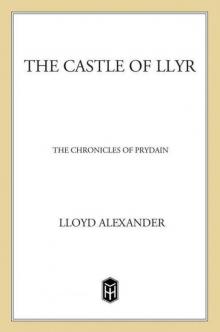 The Castle of Llyr
The Castle of Llyr Taran Wanderer (The Chronicles of Prydain)
Taran Wanderer (The Chronicles of Prydain) Taran Wanderer
Taran Wanderer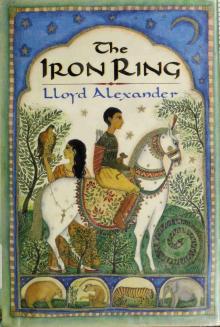 The Iron Ring
The Iron Ring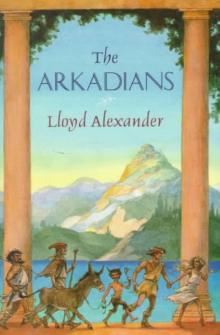 The Arkadians
The Arkadians Fifty Years in the Doghouse
Fifty Years in the Doghouse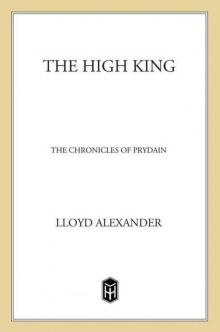 The High King
The High King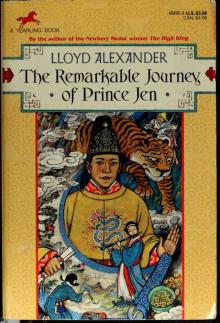 The Remarkable Journey of Prince Jen
The Remarkable Journey of Prince Jen The Book of Three
The Book of Three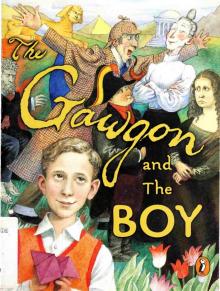 The Gawgon and the Boy
The Gawgon and the Boy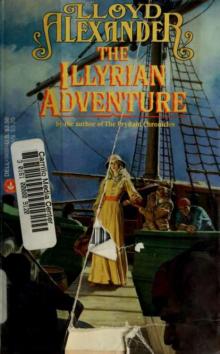 The Illyrian Adventure
The Illyrian Adventure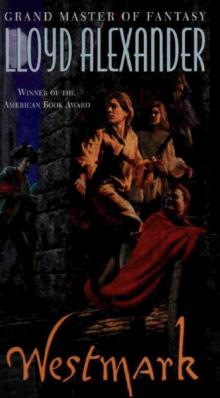 Westmark
Westmark The Black Cauldron
The Black Cauldron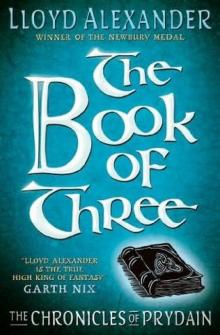 The Book of Three cop-1
The Book of Three cop-1 Taran Wanderer cop-4
Taran Wanderer cop-4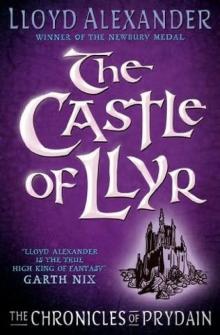 The Castle of Llyr cop-3
The Castle of Llyr cop-3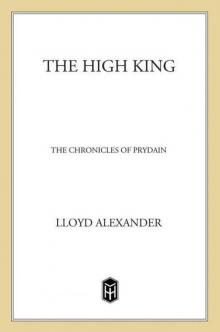 The High King (Chronicles of Prydain (Henry Holt and Company))
The High King (Chronicles of Prydain (Henry Holt and Company))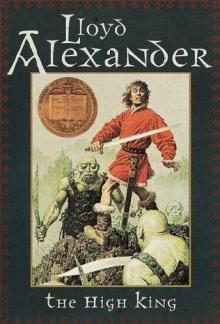 The High King cop-5
The High King cop-5 The Foundling
The Foundling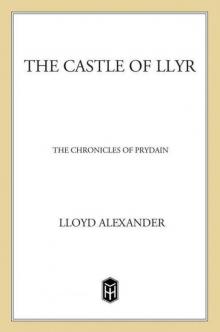 The Castle of Llyr (The Chronicles of Prydain)
The Castle of Llyr (The Chronicles of Prydain)